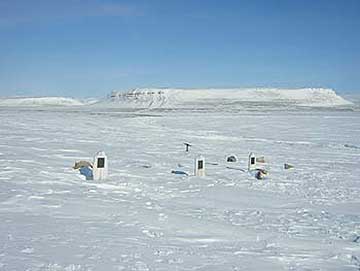 by Doug Schneider May 29, 2004
But if a team of international scientists is correct, traversing the Arctic Ocean may become routine as early as 2050. That's because scientists believe much of the Arctic Ocean will be ice-free in summer by then, thanks to an Arctic climate that continues to become warmer. The bold prediction will likely be included in an Arctic Climate Impact Assessment to be released at an international conference in Iceland in November. Gunter Weller is the executive director of the Arctic Climate Impact Assessment. Weller said, "The opening of the Arctic is perhaps one of the major, or the major impact, that we have found in this assessment. The magnitude of the expected change in sea ice conditions is pretty extraordinary." More than 250 scientists from around the Arctic spent four years compiling the report for the Arctic Council, an organization of government officials, scientists and indigenous people from Canada, Denmark, Finland, Sweden, Iceland, Norway, Russia and the United States. The report is expected to say that the Arctic is undergoing dramatic environmental change as a result of a climate that has warmed an average of five degrees in recent decades. Among the changes are disappearing sea ice, melting permafrost and glaciers, and the colonization of the tundra by trees and shrubs. The report also draws on five separate computer models to predict the Arctic's future climate. Weller says that while each model Weller said, "That's quite correct. Associated with the warming of the Arctic that's expected over the next 50 to 100 years, there will be melting of snow and ice of every form, including sea ice, also the melting of glaciers and the thawing of permafrost." Lawson Brigham is an oceanographer and a former U.S. Coast Guard captain. He's also the Alaska Office Director of the U.S. Arctic Research Commission. He says that while all the models predict easier shipping within this century, one model predicts an ice-free Arctic basin as early as 2050. Brigham said, "We're looking at maybe even trans-Arctic shipping by mid-century. That doesn't mean directly through the North Pole, but it might mean north of the island groups north of the Canadian Archipelago. So you'd essentially cross the central Arctic Ocean." Ever since John Franklin's doomed expedition to find the Northwest Passage, European nations have longed for an ice-free shipping lane through the Canadian High Arctic. Recent global warming has rekindled the belief that such a passage might soon be possible. But Brigham says any Canadian sea route likely will be blocked by disintegrating glaciers and seasonal sea ice through the rest of the century. A far more likely passage will be the so-called Northern Sea Route, along Russia's Arctic coast. Brigham said, "It is the Northern Sea Route on the Russian side where in fact the action is, where it has been and where it will be in the future. All the satellite trends and information point to more open Russian Arctic coastal seas. Six-month navigation seasons are within the realm of possibility for large cargo ships and tankers." While a warmer Arctic may be good news for the world's shipping companies, there is of course a significant downside. Scientists say a warmer Arctic will dramatically alter the region's ecosystem. At least one Canadian researcher predicts polar bears, which need sea ice to hunt seals, will be all but extinct by the end of the century. The loss of sea ice also will likely alter migration patterns for whales and force seals and walrus to search further for ice to haul out on. These environmental changes are expected to cause hardships for the Arctic's indigenous people, who depend on the land and sea for food. And, scientists say, melting Arctic permafrost and increased erosion will cause billions of dollars in damage to coastal communities, roads, homes and other infrastructure across the Arctic.
Photograph courtesy of Dr.
Russell A. Potter Story courtesy of Arctic Science
Journeys, a production of the Alaska Sea Grant Program at the
University of Alaska Fairbanks School of Fisheries and Ocean
Sciences
|
|||
